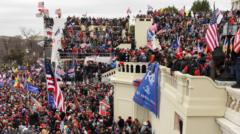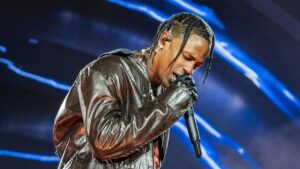Derrick Evans, a former legislator and January 6 participant, is among many rioters hoping for a pardon from Trump, who tends to position these individuals as victims of a political witch hunt. While pardons remain uncertain and may depend on individual cases, the anticipation among defendants reflects broader concerns about political influence on justice and accountability.
Rioters Await Pardon as Trump Prepares for Possible Return to Power

Rioters Await Pardon as Trump Prepares for Possible Return to Power
With Donald Trump hinting at pardons for January 6 rioters, those convicted are optimistic about their future, while legal uncertainty looms.
Derrick Evans, once a member of the West Virginia legislature, is among many who eagerly anticipate potential pardons from Donald Trump as he prepares to re-enter the political arena. After participating in the January 6 riot at the US Capitol—a significant event that aimed to overturn the 2020 election results—Evans pleaded guilty to civil disorder and served three months in federal prison. As he looks toward Trump's promised clemency, he expressed, “A pardon will be life changing.”
Throughout his campaign, Trump has frequently championed rioters, labeling them as “patriots” and pledging to pardon them upon his return to the White House. However, Trump's commitment to granting clemency has varied in specificity. While he expressed strong support for those he considers innocent, he remains cautious about issuing blanket pardons, suggesting a more tailored approach that would examine each case individually.
The January 6 events instigated one of the most extensive federal probes in U.S. history, resulting in charges against approximately 600 participants for various offenses, including the assault of law enforcement officers. Some of the most severe sentences were handed down to key figures like Oath Keepers founder Stewart Rhodes and Enrique Tarrio of the Proud Boys, neither of whom engaged in the Capitol violence directly. The ongoing investigation continues to see arrests, with the FBI seeking numerous suspects for violent acts during the insurrection.
Amid this context, numerous defendants have sought to delay hearings on their cases, driven by the potential of presidential pardons. For instance, Christopher Carnell, guilty of multiple riot-related charges, had his request denied last week. This growing sentiment hints at an eagerness among some within far-right communities, with calls for the release of individuals framed as “political prisoners” surfacing across fringe online platforms.
Wendy Via, co-founder of Global Project Against Hate and Extremism, noted the rise in enthusiasm among supporters and rioters but warned against endorsing political violence as a valid response to unfavorable outcomes. The landscape surrounding the January 6 repercussions remains complex, particularly as legal experts caution against any implications that could weaken the rule of law.
While the likelihood of a sweeping pardon for all involved seems low, supporters of individuals like Evans advocate for broader clemency. Evans went further, suggesting that reparations should accompany any pardons to adequately address the consequences faced by those imprisoned. As Trump inches closer to potential reinstallation as president, the future of Justice Department proceedings remains uncertain, igniting discussions about democracy, accountability, and the parameters of political influence on the judiciary.



















